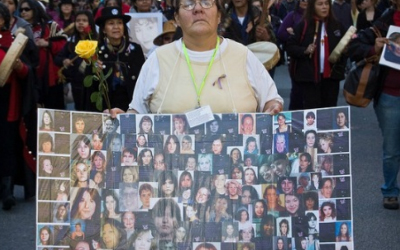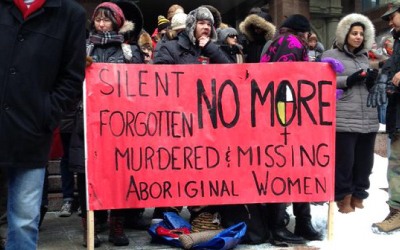Canada 150 and the Resistance Movement: What Are We Celebrating?
As we gear up to celebrate Canada 150, only one week after National Aboriginal Day, we can’t ignore the fact that not everyone is enthusiastically embracing Canada 150. “What exactly are we celebrating?” is a question many Canadians are asking. “150 years of what?” ask others.
To many, 150 years marks a time when white settlers claimed the land we call Canada and began a massive erosion of Indigenous history and culture. The colonial history of Canada reflects decades of trauma. It was the beginning of attempts to assimilate and some would even argue to eliminate Indigenous peoples and communities. Residential schools tore children from their families and communities and then placed many of those children in unsafe, emotionally, physically and/or sexually violent living situations. Children were forbidden from speaking their own languages and often prevented from maintaining healthy supportive relationships with siblings and other family members. It’s hardly surprising that such abuse has left a lasting legacy of harm.

Photo Source: @Connie_Walker
Amnesty International has reported that “the many legacies of colonialism” is one reason why the rates of violence against Indigenous women and girls is disproportionately high. The legacies include indigenous people who have struggled with addictions and the ability to establish healthy relationships and healthy families, poverty, and the disempowerment of Indigenous women and girls in their community.
Racist and sexist stereotypes, rooted in colonial attitudes, devalue and demean Indigenous women, often representing them as sex workers deserving of violence. ’Strategic silences' have ignored the extent and the seriousness of the problem. With so little concern shown, it is no surprise that perpetrators believe they will get away with violence against Indigenous women and girls. Inaction on the part of law enforcement and government to stop the violence rounds out a picture of complacency and complicity.
These are valid and understandable reasons why many Canadians, Indigenous and non-indigenous are choosing to forego the Canada 150 celebrations. Others are going a step further by participating in a resistance movement to the celebration. Christi Belcourt, a Metis visual artist, created the Twitter hashtag #Resistance150 to point out the fact that there are more than 10,000 years of history prior to the 150 years currently being celebrated.

Photo Source: Common Dreams
For those of us who both want to acknowledge and respect the history of Indigenous peoples in the land we have come to know as Canada and who hold out hope that our diverse Country can become an inclusive and equitable society, we can look to the Truth and Reconciliation Report and its recommendations as a starting point.
Whether you’re celebrating Canada 150, 150-plus, or not celebrating at all, let’s all look toward making the future of our country one that we can be proud of and one that we can truly all celebrate together in another 150 years. Happy birthday, Canada!
